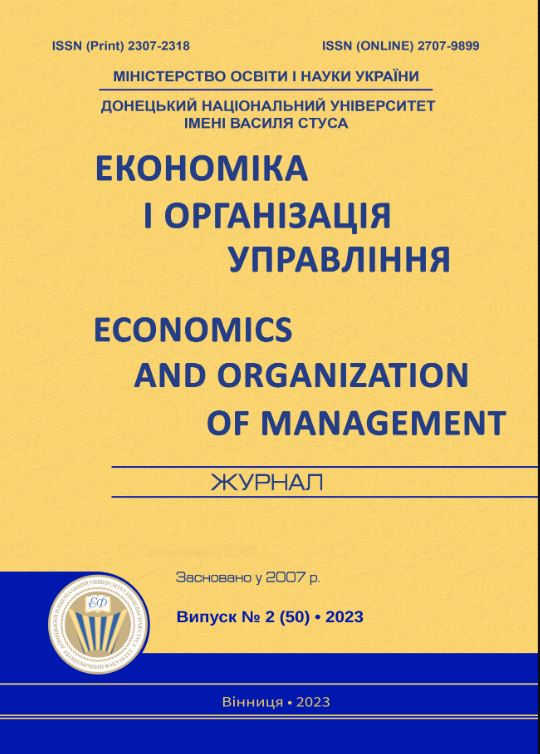Human-centred model of security in the context of preventing risks and conflicts in the social, labour and business spheres
DOI:
https://doi.org/10.31558/2307-2318.2023.2.5Keywords:
security; human-centered model; management system; conflicts; risks; social and labor relations; business sphere; social and labor sphere; economic behavior; needs; interests; developmentAbstract
The article discusses the peculiarities of building a human-centered security model considering possibilities of preventing risks and conflicts in the social, labor and business spheres. The basic prerequisites for the transformation of security policy in view of the introduction of a human-centered concept are determined. The directions of expanding the focus of the vision of the economic security system are outlined. The key principles of social erosion development in the world and Ukrainian society because of the crisis phenomena of recent years (pandemic, war) are investigated, the causes and ways of preventing social and labor conflicts, successful practices in the field of entrepreneurship are categorized. The role of economically safe behavior of employees in reducing threats to the economic security of the enterprise, as well as the possibilities and main elements of ensuring its acquisition in the labor collective are characterized. The key drivers and threats to economic security at the private level are distinguished, which allow forming an ecosystem for preventing the threat of conflicts, their emergence and growth in the context of proactive monitoring and regulation. The author proposes to expand the areas of responsibility of management entities, considering the need to reorient the model of economic security management to a human being, to put human needs at the center of security policy. The article structures the content of the activities of management entities and outlines the mechanism for ensuring a proactive approach to assessing and processing economic security risks, criteria for assessing risk profiles by the degree of probability/criticality.
References
Актуальні проблеми забезпечення економічної безпеки в Україні: колективна монографія / за ред. Я.Я. Пушака та Я.С. Піцура. Львів: Ліга-Прес, 2017. 368 с.
Ареф'єва О. В. Інноваційні імперативи формування економічної безпеки машинобудівних підприємств. Проблеми системного підходу в економіці, 2014. Вип. 50. С. 132-142. URL: http://nbuv.gov.ua/UJRN/PSPE_2014_50_21 (дата звернення: 21.03.2023)
Голіков І. В. Сутність та еволюція поняття економічна безпека. Проблеми економіки, 2014. № 1. С. 309-314. URL: http://nbuv.gov.ua/UJRN/Pekon_2014_1_47 (дата звернення: 10.03.2023)
ДСТУ ISO 31000:2018 (ISO 31000:2018, IDT) Менеджмент ризиків. Принципи та настанови. Державне підприємство «Український науково-дослідний і навчальний центр проблем стандартизації, сертифікації та якості» (ДП «УкрНДНЦ»), наказ від 29.11.2018 № 446. 23 с.
Звєряков М. І. Глобалізація і деіндустріалізація: зміст, суперечності та способи їх розв’язання. Економіка України. 2017. №11. С.3-16.
Козаченко Г. В., Адаменко Т. М. Економічна безпека підприємства: аналіз наявних визначень. Науковий вісник Полтавського університету економіки і торгівлі. Серія: Економічні науки, 2015. № 1(1). С. 69-79.
Конфлікти в часи війни: як з ними можна працювати. Онлайн-платформа LB.ua. Блог Національної платформи стайкості та згуртованості. URL: https://lb.ua/blog/npsz/559462_konflikti_chasi_viyni_yak_z_mozhna.html (дата звернення: 08.03.2023)
Ляшенко О. М. Пірамідальне оцінювання ієрархії економічної безпеки. Економічна безпека держави і науково-технологічні аспекти її забезпечення: праці наук.-практ. семінару з міжнародною участю (21-22 жовт. 2010) відп. ред. Письменний Є. М., Караєва Н. В., Черкаси: вид. Чабаненко Ю. А., 2010. 406 с.
Мельник А. Ф. Сучасні виклики регіонального розвитку: загрози економічній безпеці. Вісник Тернопільського національного економічного університету, 2017. Вип. 1. С. 39-51.
Незалежна аналітична платформа Вокс Україна. Офіційний сайт. URL: https://voxukraine.org/category/ekonomika-uk (дата звернення: 09.04.2023)
Наумов С. Як український бізнес виживає під час війни. Інформаційний портал «Економічна правда». Офіційний сайт. URL: https://www.epravda.com.ua/columns/2023/03/6/697711/ (дата звернення: 10.04.2023)
Споживацькі настрої українців після повномасштабного вторгнення. Deloitte Survey. URL: https://www2.deloitte.com/content/dam/Deloitte/ua/Documents/consumer-business/Deloitte-Survey-2022-Consumer-sentiment-during-the-war.pdf (дата звернення: 15.04.2023)
Федерація професійних спілок України. Соціальний діалог та колективно-договірне реглювання. Офційний портал. URL: https://www.fpsu.org.ua/napryamki-diyalnosti/sotsialnij-dialog-ta-kolektivno-dogovirne-regulyuvannya.html (дата звернення: 16.04.2023)
Щерб І. Імплементація людиноорієнтованого підходу в систему забезпечення економічної безпеки країни. Економіка і організація управління. №3 (43). 2021. С. 204-219.
Щерб І. Ключові маркери складових економічної безпеки держави. Регіональні аспекти розвитку продуктивних сил України. №25 (2020). С. 56-65.
Augutis J., Krikštolaitis R., Martišauskas L., Ušpuras E., & Žutautaitė I. Energetinio saugumo tyrimų raida Lietuvoje. ENERGETIKA, 2016. Vol. 62, Nr. 4, p. 232 - 246.
Bloom, D., Mahal, A., Rosenberg, L., & Sevilla, J. Economic security arrangements in the context of population ageing in India. Social security and the challenge of demographic change, 2010. Vol. 63, Nr. 3-4, p. 59-89.
Co-design isn’t new. Spoiler alert it’s over 40 years old. URL: https://szczpanks.medium.com/ (дата звернення: 16.04.2023)
Economic security : neglected dimension of national security? Center for Strategic Conferencing, Institute for National Strategic Studies. Washington DC. 2011. 130 p.
Edwards K. A., Murphy G. Addressing Economic Insecurity in the U.S. Retrieved March 10, 2023, from: https://www.nasi.org/research/economic-security/the-four-pillars-of-economic-security/ (дата звернення: 10.02.2023)
Franki V., Viskovic A. Energy security, policy and technology in South East Europe: externalities and asymmetric investment incentives. Energy Policy, 2015. Vol. 105, pp. 562-570.
Goldthau, A., & Keating, M. The International Political Economy of Energy and Natural Resources. Cheltenham, UK, Northhampton, MA, USA: Edward Elgar Publishing, 2018.
ISO 9241-210: 2019: Ergonomics of human-system interaction – Part 210: Human-centered design for interactive systems. URL: https://www.iso.org/obp/ui/#iso:std:iso:9241:-210:ed-2:v1:en (дата звернення: 11.02.2023)
Krause K., Theorizing security, state formation and the “Third World” in the post-Cold War world. Review of International Studies, Volume 24, Issue 1, January 1998, p. 126.
Popescu M. F. The Economics and Finance of Energy Security. 22nd International Economic Conference – “Economic Prospects in the Context of Growing Global and Regional Interdependencies”, IECS 2015. Procedia Economics and Finance, Vol. 27. pp. 467-473.
Shaulska L., Yakymova N., Krymova M. Innovative employment in the structure of the modern labor market. European journal of transformation studies. 2020. Vol. 8. №1. pp. 79-92
Siregar I., Zulkarnain. The Relationship be-tween Conflict and Social Change in the Perspective of Expert Theory: A Literature Review. International Journal of Arts and Humanities Studies, 2020. 2(1), pp. 9-16
Tamošiūnienė R., & Munteanu C. Modern Approaches in Quantifying Economic Security. Case Sudy of Estonia, Latvia, Lithuania and Republic of Moldova. Journal of Security and Sustainability Issues. International Entrepreneurial Perspectives and Innovative. Outcomes, 2015. 4, pp. 596-610.

